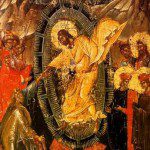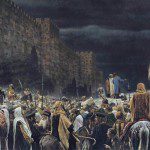
Suffer the little children
Most of us who grew up with the King James Bible learned the antique form of the verse, “Suffer the little children to come unto me, and forbid them not, for of such is the Kingdom of Heaven.” The words are a little jarring to modern ears; putting “little children” and “suffer” in the same sentence works as at least a subliminal reminder of how many little children do suffer—from preventable diseases, from abuse, from neglect. Our use of “suffer” is not unrelated to King James’. To suffer is still, necessarily, to allow, to let, whether willingly or grudgingly.
Let the little children come, we would say. Both suffer and let betoken both passivity and action: not only were the disciples to put up with children’s intrusions, but to invite them, bring them on. “Let it happen” is not so very far from “Make it happen,” as in the mysterious subjunctive of Genesis: “Let there be light.”
Suffering, in this sense is active and prophetic. It steps wholly into the moment with acceptance and embrace that transforms the inevitable and welcomes it. Consider the calm, sure reckoning with death in Jane Kenyon’s “Let Evening Come.” A series of assents cascades through the poem, culminating in a strong claim before the final submission to “evening” and, one may imagine, death: “God will not leave us comfortless, so / Let evening come.”
In a similar vein, the poems in Mary Bradish O’Connor’s Say Yes, Quickly chronicle months of treatment for ovarian cancer. The author considers her illness a sign of her times, starting with memories of playing in streets sprayed with DDT. Her urgency is not to find a cure, nor to avoid pain, but to confront necessity, to which a “Yes” may reframe months of suffering and reclaim them. Suffering, in these poems, is anything but passive. It is a vigorous, liberating exploration of limits. Suffering becomes imaginable as a task, a learning, an offering.
The aesthetic temptation and moral danger that besets testimonies to personal suffering lies largely in how we read them. It is easy to be glib about the wisdom or benefit suffering confers. The final lines of Randall Jarrell’s “90 North” are a helpful reminder not to rush too readily to spiritualize suffering: “Pain comes from the darkness / And we call it wisdom. It is pain.” This bleak refusal to treat pain as either means or metaphor is salutary, especially for those inclined too readily to avoid the “full look at the worst” that is prerequisite to healing.
If this is true, then how are we, in this season when the church brings full focus to the sufferings of Jesus and in those of cruel and sorrowing humanity, to recognize,honor and hope to bring forth what can become redemptive in the sufferings we and others fall heir to? And how do we prepare ourselves for such sufferings as may befall us, to suffer when we are called to do so, not only willingly, but wisely, and to allow that suffering to be a teacher? Perhaps the only way is to bear willing witness to others’ suffering, to honor the complexities of their, and our, sorrows, to listen to the language writers wring from pain and loss, and to allow that language to keep us humble before the metaphysical mystery to which all suffering testifies.












